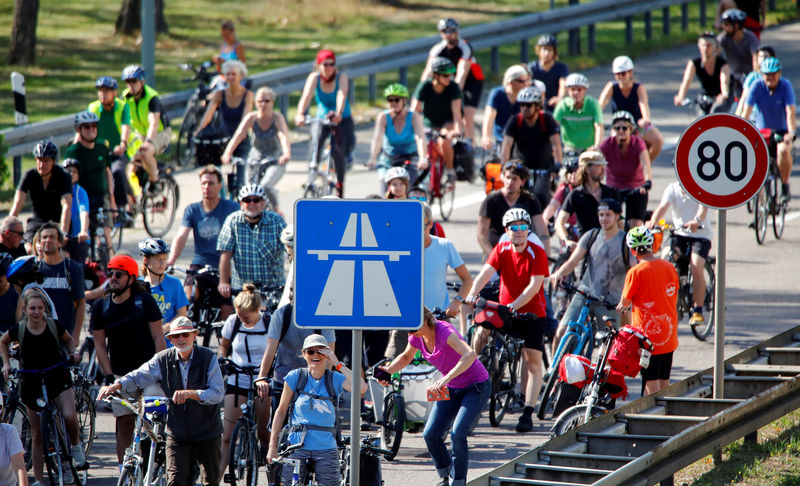By Ilona Wissenbach
FRANKFURT (Reuters) - Thousands of protesters marched in front of Frankfurt's IAA car show on Saturday to demand a swift end to combustion engines and a shift to environmentally friendly vehicles as Chancellor Angela Merkel's government prepares to unveil climate protection measures.
Police in Frankfurt said some 15,000, including many cyclists, took part in the march. Organisers put the number at 25,000 and said that around 18,000 cyclists had descended on the city.
Protesters took aim at SUVs, seen by environmentalists as a highly polluting status symbol that has no place in cities.
"STOP SUV," "SUV not cool," and "We can't replace our lungs" read some of the signs held by protesters.
Merkel's conservatives and their Social Democrat (SPD) coalition partners held talks on Friday about a package of measures expected to expedite Germany's ambition to double the share of its power from renewable sources to 65% by 2030.
The government is expected to unveil the costly measures on Sept. 20.
"Enough to policies that prioritise cars in our cities," said Ernst-Christoph Stolper, deputy head of Friends of the Earth Germany. "Pedestrians and cyclists need to conquer the urban spaces that belong to us."
The protests have urged German carmakers to speed up a transition to electric and hydrogen vehicles, after the 2015 diesel scandal in which Volkswagen admitted to cheating emissions tests.
Germany's big three, Volkswagen (DE:VOWG_p), Mercedes-Benz maker Daimler (DE:DAIGn) and BMW (DE:BMWG), assume that in 10 years about half of their cars will be emissions-free.
Carmakers are expected to invest some 40 billion euros ($44 billion) on alternative drive terrains in the next three years, highlighting the urgency to fix the image of an industry tarnished by the diesel scandal and avoid bans on diesel cars in cities.
The death of four pedestrians, including a three-year-old boy, on a Berlin street this month after the driver of a Porsche SUV apparently lost control has sparked a debate about whether cities should ban the large vehicles from their streets.
German car executives responded, saying the tragedy could have happened with any car.
"Car industry, the party is over," said Christoph Bautz of the Compact organisation, which advocates for progressive politics.
